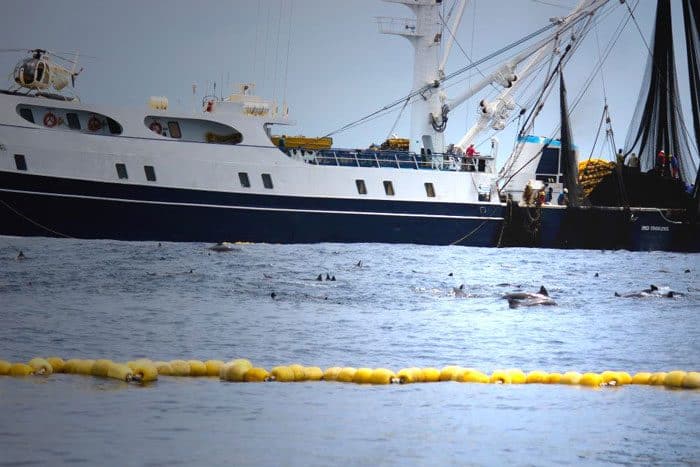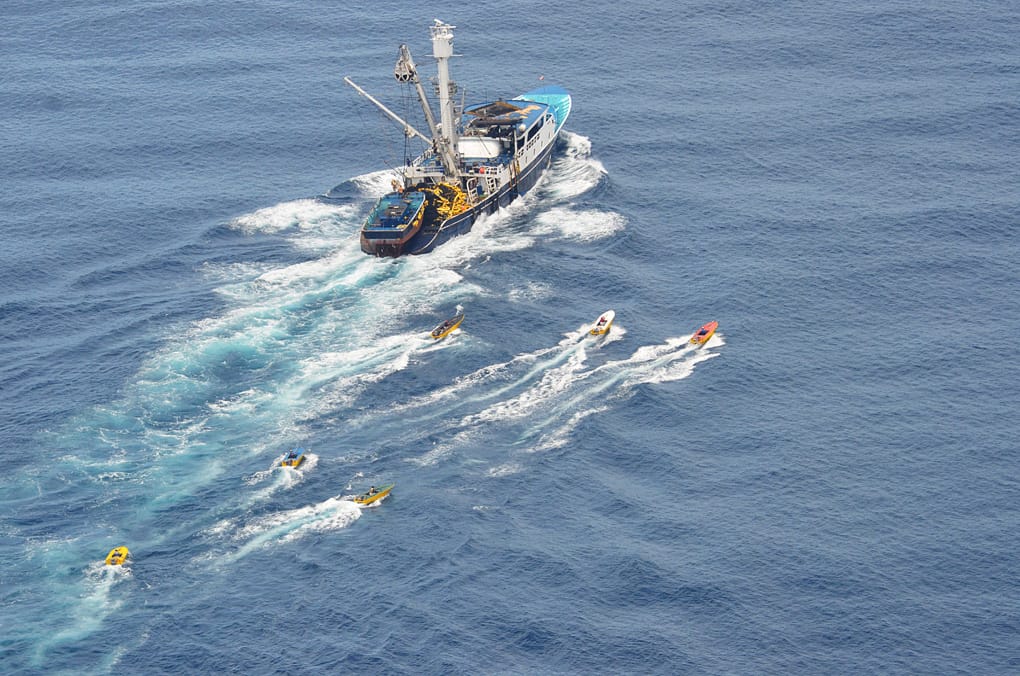Robert Nunes is a commercial fisherman who actively defends his peers in Costa Rica’s commercial fishing industry. He volunteers a lot of his time with Mauricio Gonzalez, director of the Camera de Palangreros (or the chamber of longliners) traveling the country lobbying for fisherman’s rights.
Longlining is a type of fishing that boats set miles of hooks across the ocean and is not selective in what type of fish takes the bait placed on a hook. This has caused grief among many different groups who support, sharks, marlin, and sailfish that some people consider bycatch to a longline boat. The longline sector does not consider these species bycatch as the total catch is utilized and nothing gets wasted.
But Nunes is an innovator and found a way to specifically target tuna with less than one percent bycatch. One of first to outfit his commercial boats with greenstick, an art of fishing that targets tuna and rarely catches anything but tuna.

Tuna are able to see what’s happening above the water and greenstick fishing uses lures that skip along the surface, so greenstick fishermen rarely catch anything besides tuna.
Nunes has a six-boat operation. He fishes greenstick whenever possible and catches about 80 tons of tuna a year. That still only makes up for 40 percent of his catch though. Lots of times, tuna isn’t available so he longlines for dorado, which can catch sharks and billfish.
Gonzalez, the director of the chamber of longliners, is not opposed to using greenstick, but for him, it’s a matter of cost.
“We would love to fish greenstick a lot more,” says Gonzalez “If we had access to the [tuna]. We don’t have a lot of interest in many other species, but we need to make a living.”
Costa Rica has rich fisheries, but every year, thousands of tons of tuna are fished by foreign vessels. While local fishermen face high costs, those from other countries extract Costa Rican tuna for pennies on the dollar.
“It costs us as Costa Rican fishermen a lot more than foreign tuna boats to extract tuna from the ocean,” Nunes said.
To extract 80 tons of tuna, Nunes says he paid the government $46,178 in fees for licenses, social security, INS insurance, and taxes or $1.73 per kilo of tuna extracted from Costa Rican waters.
“If you add the salaries of my employees on the boats which is part of the costs to access the resource it is over $157,000 per year,” Nunes said.
That’s almost 200 times more than what the country makes off of foreign vessels.
Costa Rica sells a license to a foreign boat for $54 per net ton of that vessel’s capacity. If that boat sells 300 metric tons to the cannery in Puntarenas it receives the next license gratis. The system is perpetual. In 2018 Costa Rica issued 12 tuna licenses to fishing boats called purse seiners. Four were paid for and the rest were given away for free. All the boats were flagged from either Nicaragua or Venezuela.
They reported a total catch of 8,422 tons of tuna. In total Costa Rica collected $153,264.48 in fees. That means Costa Rica had a benefit of just under 2 cents or 11 colones for every kilo of tuna extracted from Costa Rican waters.
Gonzalez says purse seiners are also a local fishermen’s biggest nemesis.

Purse seiners surround schools of fish with up to several kilometers of net. The net is pulled in from the bottom and everything caught in the net’s radius is hauled into the boat. This type of fishing is highly regulated due to the amount of fish and bycatch a single boat is capable of producing.
In the Americas, the Inter American Tropical Tuna Commission (IATTC) allots each member country a quota of tuna it can catch with purse seiners. The IATTC allots Costa Rica around 9,000 tonnes a year, but we catch none of it.
Costa Rica does not have any purse seine boats of its own and sells its quota to foreign flagged vessels. The system in place is outdated and Costa Rica benefits next to nothing by them being here.
We have a lot to gain from the leaving though.
As of 2014, purse seine boats can no longer work within 45 miles of Costa Rica’s shore and the sport fishing sector has seen a giant recovery in tuna. We’ve also seen more marlin and dorado which are often discarded bycatch by tuna boats.
By studying bycatch records from observers on board tuna boats in 2017, FECOP found that 25 tons of what would have been marlin bycatch were saved by reducing the area they fish. One purse seiner has the capacity to catch as much tuna in one trip as the entire commercial fleet of 300 longlines catches in one year.
“If there were more of the resource available to Costa Rican fishermen, we would target tuna. It is the fish that pays most at the market,” explained Nunes. “If you add the money generated by the sport fishing fleet for Costa Rica into the figures it is much more when you look at the whole picture.”
The benefit of giving tuna back to Costa Ricans would have a domino effect. Better living conditions for coastal families, less pressure on controversial species and more fish for the sport fishing sector as well. It would also place another star on Costa Rica’s reputation for taking care of nature.
Todd Staley has run fishing sport operations on both coasts of Costa Rica for over 25 years. He recently decided to take some time off to devote full-time to marine conservation and is the communications director at FECOP. Contact him at wetline@hotmail.com.
This story was made possible thanks to The Tico Times 5 % Club. If only 5 percent our readers donated at least $2 a month, we’d have our operating costs covered and could focus on bringing you more original reporting from around Costa Rica. We work hard to keep our reporting independent and groundbreaking, but we can only do it with your help. Join The Tico Times 5% Club and help make stories like this one possible.








